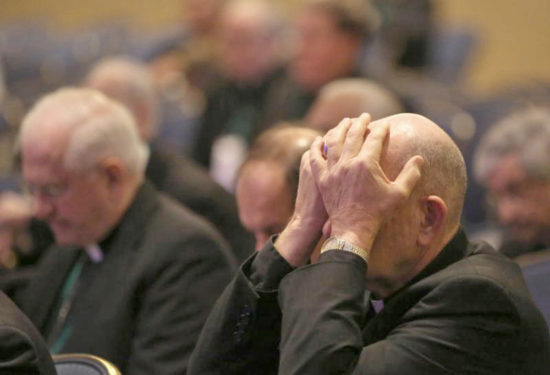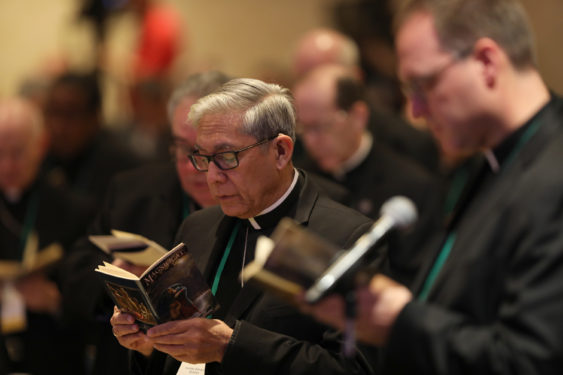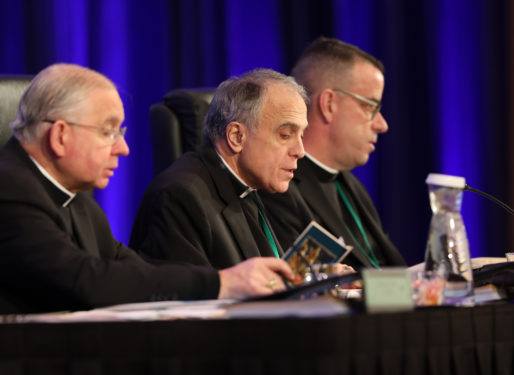By Christopher White, The Tablet’s National Correspondent

BALTIMORE — In what was expected to be a dramatic show of the United States Conference of Catholic Bishops (USCCB) fight against clerical sex abuse, Cardinal Daniel DiNardo, USCCB president, announced that the Holy See had requested a delay on such measures until after a Vatican summit on the scandal next February.
The surprise move at the start of the U.S. bishops meeting on Monday – which the cardinal himself still seemed to be processing – delays much anticipated votes to approve new standards of conduct for bishops and the establishment of an outside commission to review violations of the code.
Cardinal DiNardo said the Holy See informed him of the request late Sunday afternoon.
In September, Pope Francis announced he was summoning the head of every bishops’ conference around the globe to Rome, Feb. 21-24, for a summit on the sex abuse crisis.
The biannual meeting of the U.S. bishops in Baltimore, Md., comes after what some observers have referred to as the Catholic Church’s “summer of shame.”
Since last June, when the now former-Cardinal Theodore McCarrick was removed from ministry following revelations of sexual abuse of a former altar boy and serially abusing seminarians, the American Catholic Church has been engulfed in what many believe to be the greatest crisis the U.S. bishops have faced since the founding of its conference over 100 years ago.
A Pennsylvania grand jury report released in August, chronicling over 1,000 cases of abuse at the hands of more than 300 abuser priests over seven decades, has since sparked more than a dozen states to initiate similar efforts, leading many to believe that a nationwide investigation is likely.
Cardinal DiNardo, during his presidential address at the start of the conference, said that despite the morning’s announcement, the bishops remain committed to “the greater program of episcopal accountability,” and that in the coming days the bishops would prepare themselves “to move forward with action.”
‘Deeply Sorry’

Addressing survivors of clerical sex abuse, Cardinal DiNardo said that he was “deeply sorry.”
“In our weakness, we fell asleep,” he lamented, though he warned that the faithful could not fall into despair and presumption.
“Some would say that this is a crisis of the past,” he continued. “It is not.” He also decried “victimizing survivors all over again by demanding they heal on our timeline.”
While he said it was accurate to note that the majority of cases of sex abuse occurred decades ago, he acknowledged the pain of survivors continues.
He also said it was unacceptable for the bishops to exempt themselves from the standards of “zero tolerance,” on abuse that priests and others working for the Church are subjected.
On Monday, the bishops also heard from Archbishop Christophe Pierre, the pope’s representative to the U.S., who said “collaboration with the laity in essential.”
“We must show that we can solve problems rather than simply delegating them to others,” he challenged.
“The people of God have rightly challenged us to be trustworthy,” he continued, adding, “We must not be afraid to get our hands dirty.”
Following remarks from Cardinal DiNardo and Archbishop Pierre, the bishops adjourned for Monday, and spent the rest of the day in prayer and reflection, where they heard a testimonial from a survivor of clerical sex abuse and a religious sister on the need for healing.
On Tuesday, the bishops attempted to salvage its agenda, which began with a critical assessment of the current state of transparency and reform.
While praising the U.S. bishops for making substantial progress since the 2002 passage of its Charter for the Protection of Children and Young People, head of the National Review Board, Dr. Francesco Cesareo, told the bishops “your response to this crisis has been incomplete.”
Lack of Transparency
Cesareo specifically cited the lack of transparency of past cases of abuse and the lack of accountability of bishops. “It has taken the intervention of the state and the media to fully expose the darkness of abuse in our dioceses,” he chided.
“Today, the faithful and the clergy do not trust many of you. They are angry and frustrated, no longer satisfied with words and even with prayer,” he continued. “They seek action that signals a cultural change from the leadership of the Church.”

Cesareo went on to recommend a full review of all diocesan files dating back to 1950, with lay and independent oversight, and making those findings public.
Further, the National Review Board endorsed a full investigation into former Cardinal McCarrick and his rise to power within the Church despite decades of serially abusing seminarians, and at least in one case, a minor.
While Pope Francis has declined to authorize a Vatican investigation into the matter, as previously requested by USCCB president Cardinal DiNardo, an investigation is still expected to occur within the four dioceses in which McCarrick served.
In addition, the board announced its support of a third party reporting mechanism for claims against bishops and a new code of conduct for bishops.
“More than new national policies and procedures, it will be your individual decisions and actions, with the support and involvement of the laity that will ultimately restore the Church and bring healing and justice for survivors of abuse,” he heeded.
At the start of Tuesday’s session, Bishop Earl Boyea of Lansing, Mich., proposed that the USCCB discuss the possibility of a statement to Pope Francis requesting that he release all evidence and documentation of McCarrick. The bishops passed the proposal by a verbal consensus vote.
A report was also made by the National Advisory Council – a 48-member group that advises the USCCB’s administrative committee – that offered their support for a full investigation into the McCarrick saga.
Colonel Anita Raines, a member of the board, called for a renewed commitment to “prophetic” lives of chastity, noting that every diocesan employee is expected is sign a code of conduct.
“More, not less, should be expected of bishops,” she urged.
